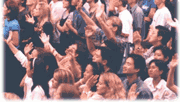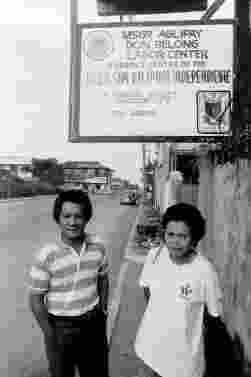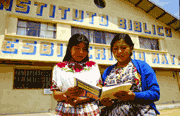
| The
main objective of this study is to contribute to the preparations
of the 2005 CWME conference.
The study covers the following areas:
|
Reflection on mission at WCC level is mainly pursued in close cooperation with churches, mission organisations and missiological associations. The publication of the International Review of Mission is an integral part of the mission study activities of the WCC.

AIDS
poster in a waiting room in a Red Cross Clinic in Kampala, Uganda
EAA/Michael Jensen

Assemblies
of God meeting in Australia
Common consultation with church communities in mission
In 1971, the Paris Missionary Society was transformed into the Evangelical Community for Apostolic Action (CEVAA). In the same spirit, the London Missionary Society became the Council for World Mission in 1977. Both organisations, as well as similar ones, embody and practice ecumenical sharing in mission and maintain close links with the WCC.
In 2000, the Cevaa – Community of Churches in Mission (Montpellier, France), the Council for World Mission (CWM, London), the United Evangelical Mission (Wuppertal, Germany) and the WCC Commission on World Mission and Evangelism (CWME) identified areas of common concern:

Church "labour centre" in
the Philippines (1988)
HIV/AIDS, dialogue with Pentecostals and charismatics, reflection on mission structures, and missiology in general.
To foster common reflection and exchange of experience on mission theory and praxis, the four organisations decided to launch a missiology study. In 2001 a group of 15 missiologists met in Cartigny near Geneva to select - among more than a dozen priorities in mission - those which needed to be addressed most urgently. They also prepared a draft programme for a major missiology consultation in 2002 whose theme would be: “Toward the fullness of life. Intercontextual relationships in mission”.
This consultation took place from 14-19 April, 2002 in London. Some 60 persons participated: delegates from the four organisations, fraternal delegates from other mission bodies, and a certain number of consultants.
The debate centred on:
Two major actors of ecumenical missiology in the last decade attended the consultation: CWM outgoing general secretary Dr Preman Niles (who, in the late eighties, led WCC work on justice, peace and the integrity of creation), and Dr Christopher Duraisingh, who coordinated the WCC study on gospel and cultures. Due to their presence, this consultation also provided a kind of status report on where ecumenical missiology is today. The full report, adopted by the consultation, provides ample evidence of the richness of the dialogue, speeches, debates and insights shared at the meeting, enhanced by exceptionally creative worship services.
Most of the questions addressed in London will impact on preparation of the 2005 world mission conference. The publication of the papers in the October 2002 issue of the International Review of Mission can be considered the first official collection of documents for that conference.
![]() Full report of the London consultation
Full report of the London consultation
Missio Dei revisited at Willingen 2002
In August 2002, a mission festival and consultation were organised by the Evangelical Church of Kurhessen-Waldeck in Germany to celebrate the 50th anniversary of the 1952 enlarged meeting of the International Missionary Council at Willingen. The consultation evaluated the interest and impact of reference to God’s own mission (missio Dei) in ecumenical mission thinking and practice over the past 50 years.
The consultation papers will be published in German by the Evangelisches Missionswerk in Hamburg, and in English in IRM (October 2003).
This process is coordinated with the Bible Study and Mission (BISAM) interest group of the International Association of Mission Studies (IAMS).

During the 2000 IAMS general assembly in South Africa, the BISAM group evaluated its earlier work - documented in a book edited by Roman Catholic New Testament scholar from Nigeria Sister Teresa Okure “To cast fire upon the earth. Bible and Mission collaborating in today’s multicultural global context” (Pietermaritzburg, Cluster Publications, 2000). The group decided to launch a new stage of study that would pay particular attention to the following biblical authors or traditions:
All three biblical authors or traditions seem particularly relevant to reflection on mission today. In 2001, biblical scholars and missiologists worked on them; their papers were published in the January 2002 issue of IRM.
A January 2002 meeting in Geneva under the moderatorship of Sister Teresa Okure and organised by the WCC examined the results and how each member of the group interprets Bible and mission.
As a follow-up, a biblical handbook for multiplicators, containing methodological approaches as well as samples of missiological reading of Bible texts will be published. It should be adapted to a congregational use. The idea is to enable people to read the Bible in relation to their context and to the mission priorities of their community, and also see how their own involvement shapes their reading.
The work done in collaboration with BISAM will also feed into the next world mission conference.
Mission in secular and postmodern contexts
In the 90’s the WCC undertook an important study on the relation between gospel and cultures, leading to the world mission conference in Salvador 1996. At the WCC assembly in Harare in 1998, a plea was made to give more weight to deal with mission in secularised contexts. After some consultation, staff dealing with mission and evangelism matters decided that the best way to respond to the request was to offer a space for dialogue between people struggling with the challenges to mission in postmodern and secular contexts.
To that end, the WCC with partners in Germany (Northelbian Center for World Mission and World Service; Evangelisches Missionswerk Hamburg, EMW) and Norway (Areopagos) organised a consultation on the theme "Believing without belonging? In search of new paradigms of church and mission in secularised and postmodern contexts". It took place in Breklum, Northern Germany, from 26 June to 2 July 2002. 50 people from five continents, but mostly from Europe and North America attended the consultation.
Participants from North America, the United Kingdom, Sweden, Germany, Russia, Latvia, Hungary, South Africa, Brazil, Mexico, India and Korea reported on mission in the secularised contexts of their countries. Study and conference programmes were presented by the WCC, the Confererence of European Churches (CEC), the Lutheran World Federation (LWF), the Leuenberg fellowship and other organisations.
Other participants offered the insights gained from scientific studies,
including:
or case studies of contemporary mission efforts such as Iona, Focolare, youth work in Belfast, community-building experience in the USA, sharing of the gospel in postmodern non church-related settings in the UK. Group work helped participants to summarise trends and raise questions. We experienced a wonderful worship life inspired by the tradition of the Iona community.
The consultation did not aim at a consensus statement, nor did it draft a common message. The papers have been published in the January and April 2003 issues of IRM.
It highlighted the diversity of situations encountered in the so-called secularised countries. North America cannot be equated with Eastern Germany. Despite common features, the situation in Sweden does not resemble that in the UK. The cultural influences of globalisation produce different “syncretisms” in different local settings in the West, and even more so in other continents and cultures.
The challenge of postmodernity and the specific religiosity experienced in conditions of secularisation is a worldwide challenge to churches in mission. It seems urgent to understand that this demands a fundamental paradigm change in the spiritual and institutional life of churches and church-based organisations, including the WCC.
Follow-up work on mission in secular and postmodern contexts is mainly in the hands of the participating networks. A specific continuation at the WCC level, a consultation on globalisation, youth culture and mission, organised at and in common with the Ecumenical Institute in Bossey, is foreseen for August 2004.
In traditional Protestant mission work, health-related questions have been addressed through medical means, personnel and institutions. Roman Catholic and Orthodox approaches kept the tradition of healing through rituals and sacraments. Since the creation of the WCC's Christian Medical Commission (CMC) at the end of the 1960s, questions related to faith and healing have been regularly addressed in the WCC.

Karen Baptist Convention's health care centre in Yangon, Myanmar
In more recent times, due to new scientific evidence of the positive correlation between religious practice and healing, but also because of the dialogue with Pentecostals, the relation between faith and health/healing has again become a priority.
For the WCC's mission and health networks, an important consultation on Faith, Health and Healing held in Hamburg’s Mission Academy in June 2000 was like a new start. The consultation documents were published in the Jan/April 2001 issue of IRM.
Several lines of study and sharing were
suggested for further work:
At its meeting in September 2001, the Commission on World Mission and Evangelism (CWME) identified the relation between faith and healing as an essential component of study towards the 2005 world mission conference.
Faith and healing was a major topic at the London consultation in April 2002. Creative dialogue between scholars from Pentecostal/charismatic traditions and delegates from ecumenical mission organisations led to the idea of calling a specific consultation on faith, healing and mission with strong Pentecostal participation.
This took place in Accra, Ghana, from 4-8 December 2002. 31 scholars and mission practitioners from Pentecostal and/or ecumenical backgrounds participated. Denominations represented ranged from Roman Catholic and Orthodox to Pentecostal. Hosted by the Church of Pentecost in Ghana, (not a WCC member church), the consultation built on the sharing of experiences and case studies by participants, as well as on theological inputs and Bible studies. Exposure visits enabled the participants to experience something of what the consultation was discussing.
The London discussions had emphasised the difference between approaches to suffering. Some referred mainly to the healing presence of Jesus as crucified and suffering servant, while others insisted on the healing presence of the resurrected Lord. In Ghana, the debates centered on interpretation of exorcism, the influence of the world of spirits, or of social structures, on people’s suffering, and the causes of illness and sickness. How to interpret healing in other religions remained an open question.
A similar consultation will take place in Latin America at the end of October 2003, followed by another in Asia in 2004, with the hope that these items will be thoroughly debated at the 2005 world mission conference in Athens.
![]() Personal
report on the Ghana consultation by Jacques Matthey
Personal
report on the Ghana consultation by Jacques Matthey
Second
International Network Forum held on 7-10 May 2002
Pattaya, Thailand: Report
contents / Introduction
to report / Order
form